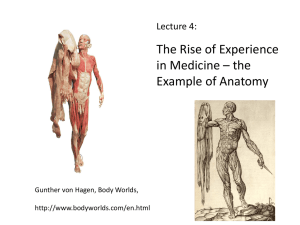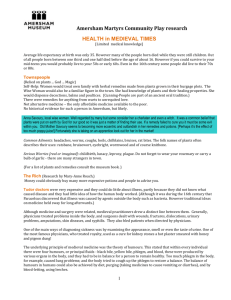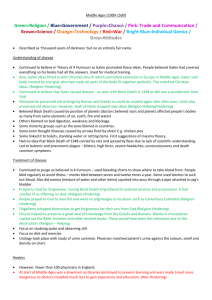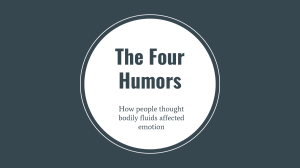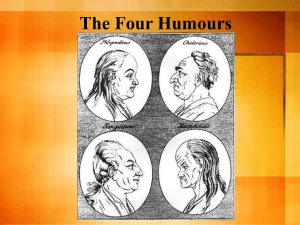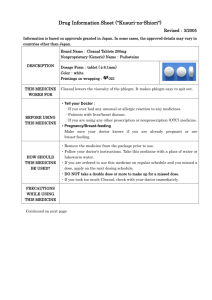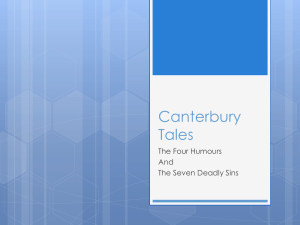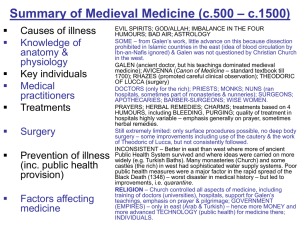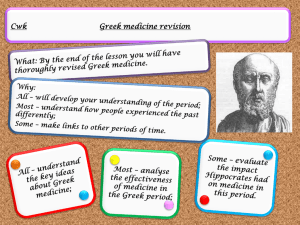4 Humours & Medieval Medicine
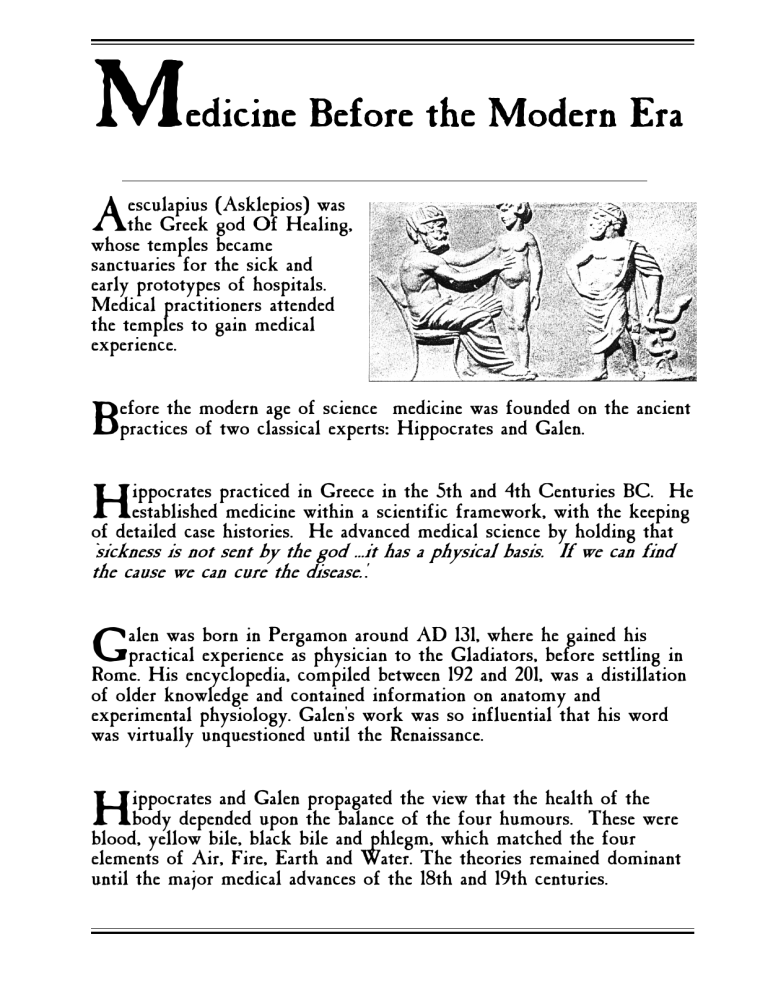
M
edicine Before the Modern Era
A esculapius (Asklepios) was the Greek god Of Healing, whose temples became sanctuaries for the sick and early prototypes of hospitals.
Medical practitioners attended the temples to gain medical experience.
B efore the modern age of science medicine was founded on the ancient practices of two classical experts: Hippocrates and Galen.
H ippocrates practiced in Greece in the 5th and 4th Centuries BC. He established medicine within a scientific framework, with the keeping of detailed case histories. He advanced medical science by holding that
`sickness is not sent by the god ...it has a physical basis. If we can find the cause we can cure the disease.'
.
G alen was born in Pergamon around AD 131, where he gained his practical experience as physician to the Gladiators, before settling in
Rome. His encyclopedia, compiled between 192 and 201, was a distillation of older knowledge and contained information on anatomy and experimental physiology. Galen's work was so influential that his word was virtually unquestioned until the Renaissance.
H ippocrates and Galen propagated the view that the health of the body depended upon the balance of the four humours. These were blood, yellow bile, black bile and phlegm, which matched the four elements of Air, Fire, Earth and Water. The theories remained dominant until the major medical advances of the 18th and 19th centuries.
T
he 4 Humours
C lassical philosophy (as proposed by Aristotle) held that the material world was made from the 4 principal elements, Fire, Air, Water, and
Earth. The 4 elements manifested themselves by the 4 primary qualities,
Hot, Cold, Moist and Dry. Each element was associated with a pair of the primary qualities (see table above)
O bservation of human diseases by doctors steeped in classical theory, lead to the identification of 4 'humours' in the body, corresponding to the 4 elements and the 4 qualities. Imbalance in the proportion of these humours could plausibly be used to explain many of the diseases that commonly afflicted the human race. For example, in the winter, cold, moist conditions lead to an outbreak of colds and 'flues of which the main symptom is an excess of phlegm. Another common symptom of illness is fever (hot body, high level of perspiration, and red skin). It is easy to see how this could be put down to an excess of blood (hot and moist) in the system.
T he theory provided a rationale by which treatments could devised. Thus, an excess of blood would treated by 'bleeding the patient, while those with too little blood would be prescribed red meats. Those with too much bile would be given an enema, whilst foods thought to be phlegm-producing
(such as milk or butter) would be forbidden where there was an excess of phlegm.
4444
Humours - Holistic or Dogmatic?
T he advantage of the system was that it gave a unified (what we might now call '
holistic
') view of the universe. Doctors looked at the whole person rather than attempted to treat specific symptoms. Diagnoses might take into account life style, diet, exercise, and astrological indications. A sensitive and pragmatic doctor using experience passed down the generations might therefore provide real help (sometimes more psychological than actual) to their patients.
H owever, dogmatic application of the theory could do real harm to the patient, as in the case of excessive bleeding. It probably also played a part in slowing down advance in medical research as doctors tended to ignore local causes of disease, and elevated theory above practical experience.
NORTH
Winter
Cold
WATER
Moon/Venus
Lungs
EARTH
Saturn
Spleen
PHLEGM
Dullness
Old Age
BLACK BILE
Sadness
Middle Age
WEST
Spring
Moist
EAST
Autumn
Dry
BLOOD
Passion
Childhood
YELLOW BILE
Anger
Youth
AIR
Jupiter
Liver
FIRE
Mars/Sun
Gall
SOUTH
Summer
Hot
C
haucer's Doctor of Physic
W ith us was a doctor of Physic;
I n all this world was none like him to pick
F or talk of medicine and surgery;
F or he was grounded in astronomy.
H e often kept a patient from the
B y horoscopes and magic natural.
W ell could he tell the fortune ascendent
W ithin the houses for his sick patient.
H e knew the cause of every malady,
W ere it of hot or cold, of moist or dry,
A
H nd where engendered, and of what humour; e was a very good practitioner.
he cause being known, down the deepest root
T
A non he gave to the sick man his boot.
R eady he was, with his apothecaries,
T o send him drugs and all electuaries; y mutual aid much gold they'd always won
-
B
T heir friendship was a thing not new begun.
W
H ell read was he in Esculapius, and
Deiscorides, and of Rufus, ippocrates and Hali, and Galen,
S eripion, Rhazes, and Avicen,
A
B vverhoes, Gilbert, and Constantine, ernard, and Gatisden, and John Damascene.
I n diet he was measure as could be,
I ncluding naught of superfluity, ut nourishing and easy. It's no libel B
T o say he read but little in the Bible.
I n blue and scarlet he went clad, withal,
L ined with a taffeta and with sandal; nd yet he was right chary of expense; A
H e kept the gold he gained from pestilence.
F or gold in physic is a fine cordial,
A nd therefore loved he gold exceeding all.'.
(Prologue of The Canterbury Tales by
Geoffrey Chaucer, translated by J.U.
T
he Medical Professions
B efore the late 19th Century medicine had a different structure than the present system. At the top were the University trained Physicians, entitled to be called 'Doctor'. They were part of the gentlemanly, professional classes and therefore expensive to consult. They became separated from the practice of surgery in the 12th Century when the Pope forbade anyone trained in clerical orders from shedding blood.
T he next tier of medical practitioner were trained by the traditional apprenticeship system with no formal course of instruction: these were the Surgeon and the Apothecary. The Surgeon, entitled only to use the plain
'Mr', undertook the treatment of wounds, breakages, hernias, skin diseases and venereal disease as well as amputations and other surgical procedures. In fact, those treatments that were either forbidden to the Physician or beneath the dignity of the Physician to treat!
T he apothecary diagnosed illnesses, and prescribed and made up medicines.
In practice, outside of the hospital environment, there was considerable overlap between the country surgeon and the country apothecary, and a socalled apothecary-surgeon would work in effect as a general practitioner
T here were also a considerable number of other medical workers, who gained their training informally including nurses, midwives, herbalists, cunning men and all sorts of unconventional dabblers, quacks and mountebanks. Given the shortcomings of contemporary medical theories there is, perhaps, little justification in maintaining a distinction between the formally and the informally trained. Indeed as the latter might be more inclined to use common sense and experience as their guide, they may well have done less harm to their patients!
Doctor - one highly proficient in a branch of learning or holding the highest university degree; specifically, doctor of medicine, (hence) medical practitioner.
